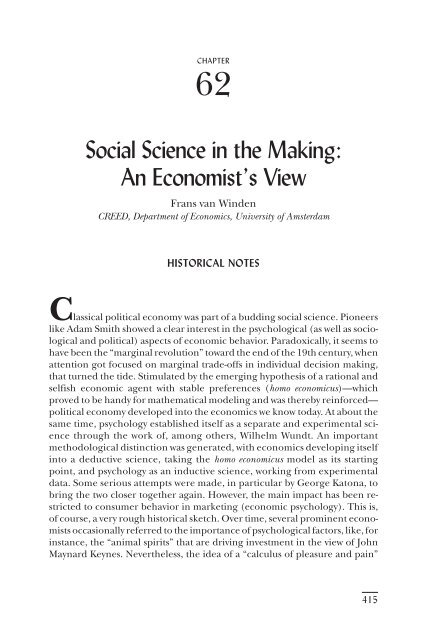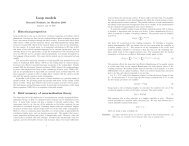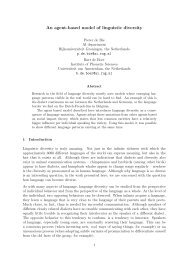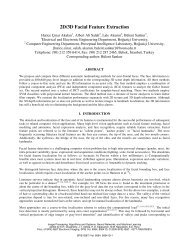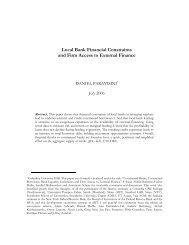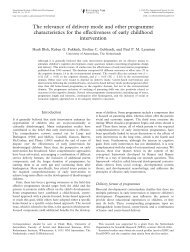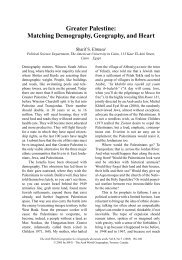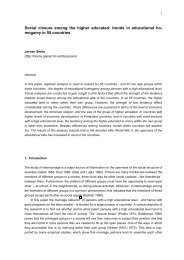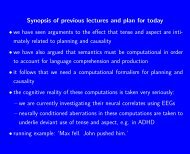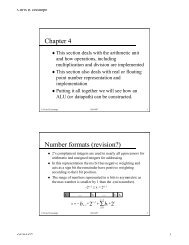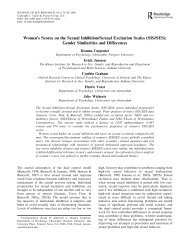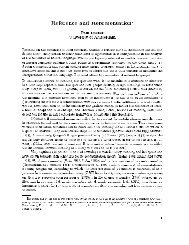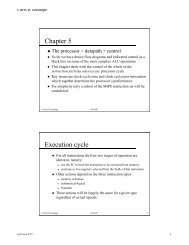PDF-file - Universiteit van Amsterdam
PDF-file - Universiteit van Amsterdam
PDF-file - Universiteit van Amsterdam
You also want an ePaper? Increase the reach of your titles
YUMPU automatically turns print PDFs into web optimized ePapers that Google loves.
CHAPTER62Social Science in the Making:An Economist’s ViewFrans <strong>van</strong> WindenCREED, Department of Economics, University of <strong>Amsterdam</strong>HISTORICAL NOTESClassical political economy was part of a budding social science. Pioneerslike Adam Smith showed a clear interest in the psychological (as well as sociologicaland political) aspects of economic behavior. Paradoxically, it seems tohave been the “marginal revolution” toward the end of the 19th century, whenattention got focused on marginal trade-offs in individual decision making,that turned the tide. Stimulated by the emerging hypothesis of a rational andselfish economic agent with stable preferences (homo economicus)—whichproved to be handy for mathematical modeling and was thereby reinforced—political economy developed into the economics we know today. At about thesame time, psychology established itself as a separate and experimental sciencethrough the work of, among others, Wilhelm Wundt. An importantmethodological distinction was generated, with economics developing itselfinto a deductive science, taking the homo economicus model as its startingpoint, and psychology as an inductive science, working from experimentaldata. Some serious attempts were made, in particular by George Katona, tobring the two closer together again. However, the main impact has been restrictedto consumer behavior in marketing (economic psychology). This is,of course, a very rough historical sketch. Over time, several prominent economistsoccasionally referred to the importance of psychological factors, like, forinstance, the “animal spirits” that are driving investment in the view of JohnMaynard Keynes. Nevertheless, the idea of a “calculus of pleasure and pain”415
416 M VAN WINDEN(Jeremy Bentham) had definitively lost impetus, and Adam Smith’s (other)classic work on moral sentiments had fallen into obscurity.MARCHING SEPARATELYThe academic division of labor between psychology and economics, allowingthese disciplines to exploit and explore their methodologies to the full, hasbeen very productive in the past. However, it is also felt that, although economistsmay have been too eager to construct “logical superhighways” withoutmuch empirical support, psychologists were perhaps too reluctant to ventureformalized generalizations using their wealth of experimental data. Recentdevelopments suggest that the combination of experimentation and mathematicalformalization is a powerful match for further scientific progress and ispromising in terms of bringing psychology and economics closer together. Becausethe focus in this essay is on social psychology, I discuss these issues usingsome of my own experiences concerning research on social interaction ingroups. My aim is to illustrate the instrumentality of experimentation for makingbridges, and to indicate the importance of theoretical modeling as well asthe rele<strong>van</strong>ce of institutions.LESSONS FROM SOCIAL DILEMMAS AND PUBLIC GOODSA major topic in the social sciences concerns the behavior of individuals in socialdilemmas. In economics, important theoretical work has been done regardingthe related issue of public goods. This work has generated manyinsights into the responses of homo economicus to changes in behavioral constraints(income, prices). However, the observation that in reality the predictedfree-riding seemed less severe stimulated an interest in applyinglaboratory experimentation, which was emerging as a research method in economics(in the early 1960s successfully applied to markets by Nobel laureateVernon Smith). About two decades of experimental work has clearly shownthe restraining nature of the assumptions of the homo economicus model(see Ledyard, 1995; <strong>van</strong> Winden, 2002). Because public good environmentsare perhaps the simplest to study behavior in groups, and groups are a core issuein the social sciences, I see the following experiences as important from abridging perspective.First, by getting involved in a shared methodology (experimentation), it becamemore difficult to neglect the findings of social psychologists.Second, the experimental designs were in the domain of the theoreticalmodels, making it difficult for theorists to contest the results and stay within anivory tower (which was easier with field empirical observations plagued by allsorts of noise effects). For the development of experimental economics, thissupport from (particularly game) theorists has been extremely important.Third, the emphasis in economics on modeling proved very helpful—firstby structuring experimental work through the application of theoretical tools
62. SOCIAL SCIENCE IN THE MAKING M 417and insights, which provided direction and discipline. Furthermore, it hasstimulated the development of new models, incorporating robust experimentalfindings, which can also be tested on other environments (e.g., Fehr &Schmidt, 1999). Note that it is only through modeling that we can ever hope togeneralize in a practical way to other parameter values and cases, other thanthe specific ones studied in experiments.Fourth, as argued by Lewin (1967, p. 193) experimentation with groups leadsto a natural integration of social sciences because it forces the experimenter toconsider all rele<strong>van</strong>t factors even if he or she cannot analyze them satisfactorilyyet. Factors like group identification, social approval, reciprocity, and normshave found a place in the vocabulary of the experimental economist.Finally, in my experience, bridging is particularly stimulated by (a) educationaltraining in the substantive issues or methods of different social sciences(like experimentation or mathematical modeling, which both work as a linguafranca), (b) meetings on a shared methodology (like the Economic Science Associationconferences in experimental economics that are not only attendedby economists), and (c) some commitment to joint research projects withother social scientists (via dedicated research centers or conditioned researchfunding).ILLUSTRATIONTo exemplify, I will point at Bridging activity in my own research group atCREED—the Center for Research in Experimental Economics and PoliticalDecision Making. CREED started in 1991, funded by a large “pioneer grant”from the Netherlands Organization for Scientific Research (NWO), to createan innovative research group and to develop experimental economics inthe Netherlands. One of the conditions was to incorporate social psychologicalexpertise in the project. This condition stimulated several experimentalstudies using the “Ring Test” (Liebrand, 1984) for measuring “social valueorientation,” showing the importance thereof for contributions to publicgoods (e.g., Offerman, Sonnemans, & Schram, 1996). Subsequently, thissame test was used in a novel way to measure“socialties.”Byapplyingthetesttwice, before and after social interaction, one can derive the attitude towardthe specific other interacted with in comparison with a generalized other(e.g., <strong>van</strong> Dijk, Sonnemans, & <strong>van</strong> Winden, 2002). These experiments were instigatedby, and supported, a theoretical model that capitalized on other socialpsychological work by, among others, George Homans, whose analytical styleis inviting for a formally trained economist (<strong>van</strong> Dijk & <strong>van</strong> Winden, 1997). Anext step has been to apply this technique to larger formal groups, showingthat informal groups characterized by positive as well as negative ties mayform through interaction (Sonnemans, <strong>van</strong> Dijk, & <strong>van</strong> Winden, 2001). Anothernatural outgrowth involved the application to social capital issues,which happened in the context of an interdisciplinary research programwith sociologists funded by NWO (e.g., Riedl & <strong>van</strong> Winden, 2003). Subse-
418 M VAN WINDENquently, this research has been extended toward the experimental investigationof endogenous networks and related theoretical models. Theconception of social ties as being determined by feelings and emotions, andthe experimental support obtained, stimulated in its turn a new major projecton the economic significance and modeling of emotions, which extendedand deepened contacts with psychologists (e.g., Bosman,Sonnemans, & Zeelenberg, 2001; Bosman & <strong>van</strong> Winden, 2002; <strong>van</strong> Winden,2001). It also clearly showed the hindrance of existing disciplinary bordersfor PhD students to get adequate cross-disciplinary training. Finally, anotherimportant incentive for bridging turned out to be the participation in EuropeanCommunity (EC)-funded research networks. At CREED this has stimulated,among others, recent experimental research on social interactionwithin and between groups in collaboration with social psychologists (e.g.,Bornstein, Schram, & Sonnemans, 2001). All these developments at CREEDseem to nicely illustrate the influence of the aforementioned factors.SUCCEEDING TOGETHERRecent developments suggest that productivity in the social sciences will benefitfrom crossing existing academic barriers, and that such crossing is moreand more likely. One development is the growing attention in economics forcognitive limitations and peculiarities (bounded rationality; see Rabin, 1998).Another one concerns the gradually increasing appreciation in economics—as in psychology, for that matter—of the significance of emotions as determinantsof decision making and their instrumentality for taking good decisions(e.g., Elster, 1998). It may be more appropriate to speak here of “bounded reasoning”than of bounded rationality. In a sense, we are going back to Bentham(Kahneman, Wakker, & Sarin, 1997). Furthermore, in both disciplines there isa growing awareness of the importance of evolutionary forces (for economics,see Robson, 2001). A related development is that researchers from both sideswill increasingly have to deal with the challenging findings obtained frommodern brain research, with neuroeconomics emerging as a new field(Camerer, Loewenstein, & Prelec, 2005). These developments should be seenin combination with the sharing of experimentation as a research method andan increasing uneasiness in economics about sheer formalization and in socialpsychology about the lack of more general theories.However, the present institutional environment (at least in Europe), withfaculties in universities functioning as bureaucratic agencies and little competitionbetween universities, is severely frustrating cross-disciplinary activity(Lohmann, 2003).CONCLUSIONSSocial science is in the making, but its success seems particularly conditionedon the willingness to put experimentation, including computer simulation,
62. SOCIAL SCIENCE IN THE MAKING M 419and formalization on an equal footing (cf. Lewin, 1967, p. 236). By now, experimentaleconomics is an accepted research method in economics, with papersacross the whole domain of economics being regularly published in the topjournals, labs at major economics departments, and its own specialized journal.Regarding their analytical methodology, however, economists will have togrow satisfied with the construction of theoretical highways, for particularclasses of problems, instead of malfunctioning superhighways. My perceptionis that a growing number of behavioral economists are heading in this direction.Although they are still a minority, their position will further gain momentum.Whether the theoretical innovations of behavioral economics will becumulative in the longer run is unclear, but I do not see why we should be pessimistic(cf. Gintis, 2003; Kahneman, 2003). In their turn, social psychologistswill have to venture more fast-track formal theory building. In this respect,they could benefit from the experience and insights of economists. Fromreading their journals, I have also the impression that social psychologistscould benefit from paying more attention to the findings of experimentaleconomists. Finally, both sides should be more open to the pros and cons of itsexperimental methodology. Use of monetary incentives should not be an automatismfor economists, whereas psychologists should consider no deceit asdefault (Hertwig & Ortmann, 2001).The fact that Daniel Kahneman and Vernon Smith were awarded the NobelPrize is a hopeful sign for bridging, especially, if it also induces some institutionalchanges, like cross-disciplinary research centers and core curricula.ACKNOWLEDGMENTSComments by Joep Sonnemans and an anonymous referee are gratefullyacknowledged.REFERENCESBornstein, G., Schram, A., & Sonnemans, J. (2004). Do democracies breed chickens?In R. Suleiman, D. V. Budescu, I. Fischer, & D. M. Messick (Eds.), Contemporarypsychological research on social dilemmas (pp. 248–268). Cambridge:Cambridge University Press.Bosman, R., & <strong>van</strong> Winden, F. (2002). Emotional hazard in a power-to-take experiment.Economic Journal, 112, 147–169.Bosman, R., Sonnemans, J., & Zeelenberg, M. (2001). Emotions, rejections, and coolingoff in the ultimatum game. Unpublished manuscript, University of <strong>Amsterdam</strong>.Camerer, C., Loewenstein, G., & Prelec, G. (2005). Neuroeconomics. Journal of EconomicLiterature, 43, 9–64.<strong>van</strong> Dijk, F., Sonnemans, J., & <strong>van</strong> Winden, F. (2002). Social ties in a public good experiment.Journal of Public Economics, 85, 275–299.<strong>van</strong> Dijk, F., & <strong>van</strong> Winden, F. (1997). Dynamics of social ties and public good provision.Journal of Public Economics, 64, 323–341.Elster, J. (1998). Emotions and economic theory. Journal of Economic Literature, 36,47–74.
420 M VAN WINDENFehr, E., & Schmidt, K. M. (1999). A theory of fairness, competition and cooperation.Quarterly Journal of Economics, 114, 817–868.Gintis, H. (2003). Towards a unity of the human behavioral sciences. Unpublishedmanuscript, Santa Fe Institute.Hertwig, R., & Ortmann, A. (2001). Experimental practices in economics: A challengefor psychologists? Behavioral and Brain Sciences, 24, 383–403.Kahneman, D. (2003). A psychological perspective on economics. American EconomicReview (Papers and Proceedings), 93, 162–168.Kahneman, D., Wakker, P. P., & Sarin, R. (1997). Back to Bentham? Explorations ofexperienced utility. Quarterly Journal of Economics, 112, 375–405.Ledyard, J. (1995). Public goods: A survey of experimental results. In J. H. Kagel &A. E. Roth (Eds.), The handbook of experimental economics (pp. 111–194). Princeton:Princeton University Press.Lewin, K. (1967). Field theory in social science (D. Cartwright, Ed.). London:Tavistock.Liebrand, W. B. G. (1984). The effects of social motives, communication and groupsizes on behavior in a n-person multi stage mixed motive game. European Journalof Social Psychology, 14, 239–264.Lohmann, S. (2003). Academia. In C. K. Rowley & F. Schneider (Eds.), Encyclopediaof public choice (Vol. 2, pp. 3–5). Boston: Kluwer.Offerman, T., Sonnemans, J., & Schram, A. (1996). Value orientations, expectationsand voluntary contributions in public goods. Economic Journal, 106,817–845.Rabin, M. (1998). Psychology and economics. Journal of Economic Literature, 36,11–46.Riedl, A., & <strong>van</strong> Winden, F. (2003). Information and the creation and return of socialcapital: An experimental study. In H. Flap & B. Völker (Eds.), Creation of socialcapital (pp. 77–103). London: Routledge.Robson, A. J. (2001). The biological basis of economic behavior. Journal of EconomicLiterature, 39, 11–33.Sonnemans, J., <strong>van</strong> Dijk, F., & <strong>van</strong> Winden, F. (2001). On the dynamics of social tiesstructures in groups. Unpublished manuscript, University of <strong>Amsterdam</strong>.<strong>van</strong> Winden, F. (2001). Emotional hazard exemplified by taxation-induced anger.Kyklos, 54, 491–506.<strong>van</strong> Winden, F. (2002). Experimental investigation of collective action. In S. L.Winer & H. Shibata (Eds.), Political economy and public finance (pp. 178–196).Cheltenham: Edward Elgar.


